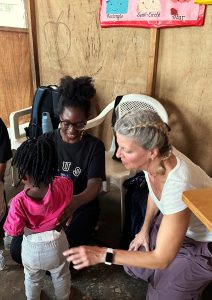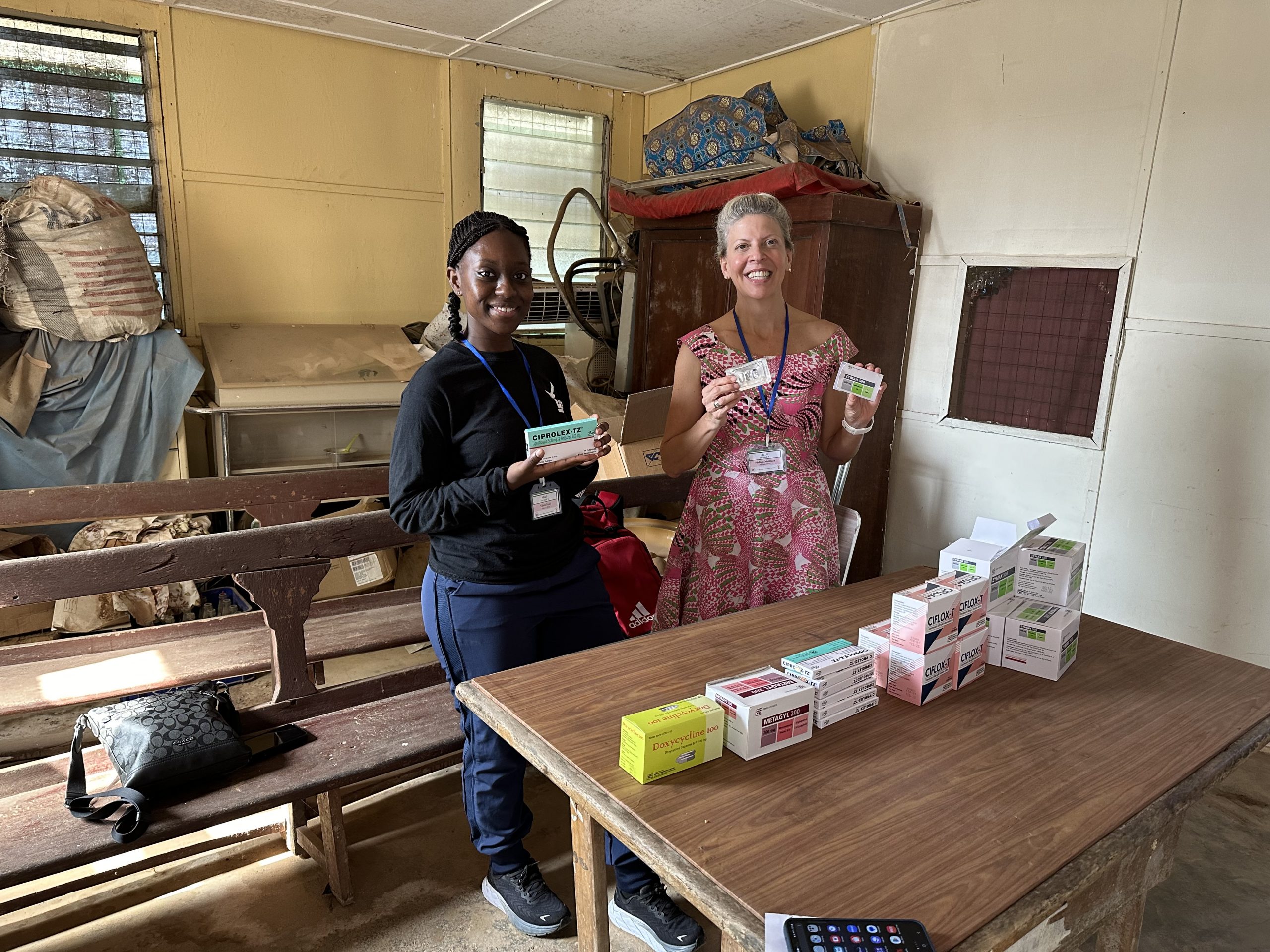Author: Melissa Mattison, PharmD, Western New England University
On January 5, 2024, students, faculty, and interested healthcare professionals gathered at JFK airport in New York City to embark on a 5,000 mile interprofessional journey across the Atlantic Ocean to Ghana, West Africa. Our group was well represented across professions with a mix of practicing and student physicians, physician assistants, pharmacists, nurses, community health workers, occupational therapists, and masters of public health degree seekers. After nearly a year of planning and zooming, we were together to meet our Ghanian partners in Aburi. Aburi is a beautiful town that sits on a mountain and has a population of 20,000 people. We arrived jet lagged but excited, overflowing with energy and enthusiasm. After one night in the capital city of Accra, we finished picking up our last group member on Sunday and headed to Aburi, all 21 of us on a small bus. Our driver was a man named Johnson whom we had the pleasure of working with last year but with a group half the size. Driving is no small undertaking in Ghana with a lack of lines, signs, and plenty of pedestrians. As we sat with luggage on our laps, at our feet, and overhead, we nervously contemplated what exactly we would be doing each day and wondered what healthcare looks like on a different continent.
We were introduced and immersed quickly in the culture of the area. We toured clinics, hospitals, small villages, and patient homes. The Ghanian people were warm and welcoming, we even had a tribal ceremony, complete with drumming, welcoming us and granting us permission to deliver care in their community. Marie, our interprofessional leader, was crowned honorary queen of the village!
As the week wore on, we picked public health projects with sustainability in mind. Public health in Ghana is directed at the government level and serves all people in a comprehensive way, especially children for scheduled, routine check-ups and immunizations. It was amazing to see people walk up carrying their babies, wrapped in bright colored fabric, on their backs to clinic which was held under mango trees. With little air conditioning, many clinics are open-air and notes are taken manually. Prenatal and postnatal care is robust and parallels care in the United States.
 We were not just working in clinics side by side with public health nurses, who do everything and enjoy a wide scope of practice, but we also were breaking bread with our hosts and fellow medical professionals. Johnson’s sister, Vivian, cooked each dinner for us, all Ghanian food. We enjoyed jaloof rice, ground nut soup, fufu, banku, and some vegetarian options, with the freshest, melt in your mouth mango and pineapple for dessert. To fully explore Ghana, we toured and shopped too. We visited Shai Hills Resource Reserve and hiked in the rain, through mud and a bat cave, to breathtaking views, a somewhat perilous journey that we all survived. Some ventured to Elmina Castle, a slave-trading post, that invoked many emotions. A more light-hearted trip was to a cocoa farm complete with samples.
We were not just working in clinics side by side with public health nurses, who do everything and enjoy a wide scope of practice, but we also were breaking bread with our hosts and fellow medical professionals. Johnson’s sister, Vivian, cooked each dinner for us, all Ghanian food. We enjoyed jaloof rice, ground nut soup, fufu, banku, and some vegetarian options, with the freshest, melt in your mouth mango and pineapple for dessert. To fully explore Ghana, we toured and shopped too. We visited Shai Hills Resource Reserve and hiked in the rain, through mud and a bat cave, to breathtaking views, a somewhat perilous journey that we all survived. Some ventured to Elmina Castle, a slave-trading post, that invoked many emotions. A more light-hearted trip was to a cocoa farm complete with samples.
Traveling 5,000 miles to partake in public health measures, studying them firsthand, up close, is an invaluable lesson in public health and interprofessional learning. Working together at the four clinics and screenings we hosted allowed us to not only work with our colleagues of all healthcare backgrounds but also enabled us to learn from Ghanian healthcare professionals. One of my favorite events was the first cervical cancer screening. Thermocoagulators were obtained via a grant and donations to enable our ob/gyn to train midwives in Ghana to provide screenings and treatment. We also screened for chlamydia, gonorrhea, typhoid, malaria, HIV, and high blood glucose and provided free medications as appropriate. The hands-on work was the highlight for me each and every day.
Many hands make this happen but one superstar stands out as the lead, the one who brings us all together and works interprofessionally each week in clinic, Marie Meckel. I always joke Marie goes to Ghana as frequently as I go to nearby Rhode Island. Marie has innovative ideas and the energy to make it all happen, growing this trip each year and making an impact here and abroad, all with an interprofessional lens.
 Healthcare Workforce Partnership
Healthcare Workforce Partnership 
 REB - REGIONAL EMPLOYMENT BOARD OF HAMPDEN COUNTRY, INC.
REB - REGIONAL EMPLOYMENT BOARD OF HAMPDEN COUNTRY, INC.